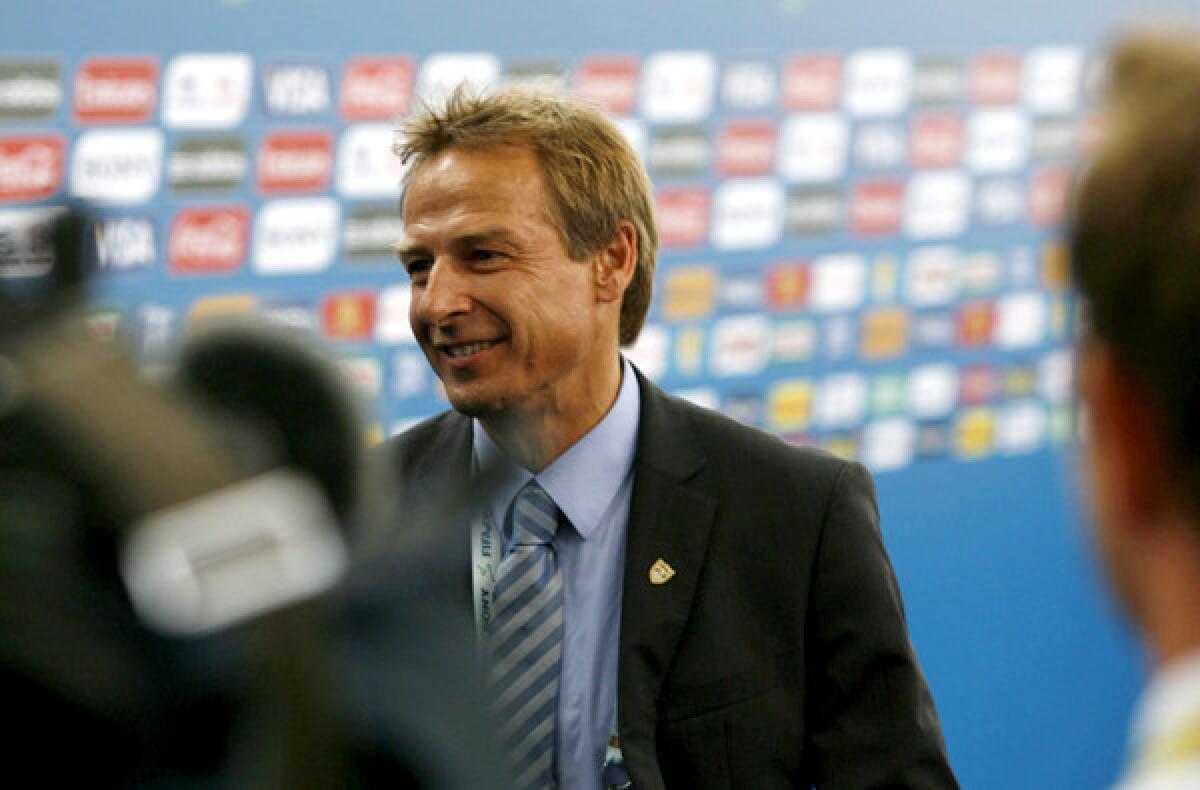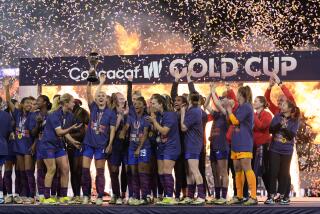Brazil 2014 World Cup draw: live group-by-group updates

Juergen Klinsmann, who played in one World Cup for Germany and coached the country in another, will now compete against his nation in Brazil this summer after the U.S. was drawn into Germany’s group for the 2014 World Cup.
The U.S. will play its first game against Ghana, the team that eliminated the Americans in the last two World Cups. The U.S. will have the most difficult travel schedule, having to cover nearly 9,000 miles for its three group-play matches.
Portugal, with superstar Cristiano Ronaldo, will be the fourth team in the group.
Mexico, meanwhile, was been drawn into Group A with host country Brazil. Mexico will play its first game against Cameroon.
The most competitive of the four groups that were drawn Friday looks to be Group D, with Uruguay, Costa Rica, England and Italy.
::
The group-by-group breakdown:
A: Brazil, Croatia, Cameroon, Mexico
B: Spain, Netherlands, Chile, Australia
C: Colombia, Greece, Ivory Coast, Japan
D: Uruguay, Costa Rica, England, Italy
E: Switzerland, Ecuador, France, Honduras
F: Argentina, Bosnia-Herzegovina, Iran, Nigeria
G: Germany, Portugal, Ghana, USA
H: Belgium, Algeria, Russia, South Korea
::
Will the U.S. end up in a Group of Death or will it have a relatively easy run through group play in next summer’s World Cup? We could know soon since the 32 qualifiers for this summer’s tournament in Brazil will be drawn into eight four-team groups Friday morning.
In preparation for the draw, all 32 teams were dispersed into four pots, arranged primarily by geography. The first pot consists of the seven seeded teams plus Brazil, the host country. Those teams will be drawn into groups lettered A through H, then one team from each of the remaining three pots will be randomly drawn into groups behind the seeded countries.
FIFA arranged the pots based on geography to prevent teams from the same region -- the U.S. and Mexico, for instance -- from playing one another in the opening round. That hurts the U.S. more than any other country, though, because six of the eight World Cup teams ranked 31st or lower in the world by FIFA are in the same pot with the 14th-ranked Americans and can’t be drawn into the same group.
The best-case scenario for the Americans would be a group made up of Switzerland, on paper the weakest of the seeded teams, Algeria and either Croatia or Bosnia-Herzegovina, a World Cup newcomer. Of those teams, only Switzerland is listed ahead of the U.S. in FIFA’s world rankings.
The nightmare would be a group headed by either defending champion Spain or Brazil, joined by the Netherlands and Ghana. Spain is the defending champion while Brazil, the host country, hasn’t lost a competitive match at home since 1975. The Netherlands, the 2010 runner-up, went 9-0-1 in qualifying and Ghana eliminated the U.S. in the last two World Cups.
Of those countries, only Ghana is ranked outside the top 10.
But in addition to determining who the U.S. will play, the draw will also determine where and when those matches will take place. And given Brazil’s massive size -- it is the largest contiguous country to play host to a World Cup -- that is no small matter.
The team that meets Brazil in the tournament opener on June 12 in Sao Paulo, for example, will have to travel more than 2,400 miles to Manaus in the Amazon for its second match before playing its final group-round game in the Atlantic port city of Recife. If that teams turns out to be the U.S., which plans to return to its training facility in Sao Paulo between matches, that draw would mean more than 8,000 miles of travel in 11 days.
The U.S. bused to all four of its matches in 2010 and none of the trips were farther than 75 miles.
Then there are the elements with the bounce of a ping-pong ball sending some teams to games in cool southern cities and others to midday games in the hot and humid northeast. With the 2014 World Cup field among the strongest ever, travel and weather could play a big factor in determining who leaves early and who gets to stick around a while.
ALSO:
Kobe Bryant quiz: How much have you forgotten?
USC football: Steve Sarkisian to call offensive plays
Lindsey Vonn will return to World Cup ski racing on Friday
More to Read
Get our high school sports newsletter
Prep Rally is devoted to the SoCal high school sports experience, bringing you scores, stories and a behind-the-scenes look at what makes prep sports so popular.
You may occasionally receive promotional content from the Los Angeles Times.







